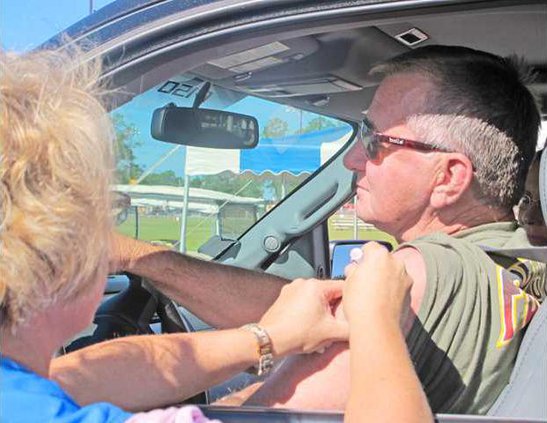Influenza is contagious and can take the life of the very young, very old and those with a weakened immune system, said Maj. Mark Killibrew, chief of Preventive Medicine for Winn Army Community Hospital.
On Wednesday and Thursday, Killibrew was busy supervising Winn’s sixth annual drive-thru flu clinic in one of the hospital’s parking lot. Drivers were directed to one of three lanes where tents housed public health technicians and nurses who helped process passengers’ information and administer the shots. One lane was exclusively for high-occupancy vehicles — moms with children.
“(The drive-thru clinic) is something we do for our (active-duty) military beneficiaries, federal employees, military retirees and their family members,” Killibrew said. “Everybody benefits. (Active-duty) soldiers’ family members are as not transitional as their spouses, so the flu shot they get here will cover most viruses in this area. Most of our soldiers aren’t going to all four corners of the world anymore and aren’t bringing back other forms of the flu.”
Killibrew explained that active duty soldiers get their flu shots in their unit’s troop medical clinic. He said the drive-thru clinic makes it easier for family members and federal workers, as well as retirees and their families to get the vaccine. That makes it better for the entire community, he said, noting that the more people who are vaccinated against the flu, the fewer cases of the flu should occur in the area.
He advises those with life-threatening allergies, those who’ve had Guillain-Barré syndrome or just aren’t feeling well not to get the flu shot.
Killibrew explained there are two types of flu vaccines. He said an “inactivated” vaccine, which does not contain any live virus, is given through an injection commonly called a flu shot. A live, “attenuated” weakened virus vaccine is sprayed in the nostrils. He said this vaccine is only available for those older than 2 and younger than 49.
Alondria Woodard, health technician with Winn’s Preventive Medicine, said that as patients drive up to the nurse’s station, they give their military identification card to a nurse who brings the ID card to her. She scans the card and watches a laptop pop up their medical information. She punches in whatever vaccine the patient is getting while the nurse completes paperwork. Minutes later, the patient is getting his or her shot.
Retired Marine Floyd Kicklighter’s full-size pickup made it difficult for nurse practitioner Sandra Durrence to rub alcohol on his left shoulder and give him the shot. She was nearly on tiptoes as she administered the shot while Kicklighter rested his left hand in his lap and his right hand on the steering wheel.
Bess Stone allowed the engine in her Dodge Challenger to purr as she talked with LPN Michael Sutton. Stone said she was doubly qualified to get the free shot, being a Department of the Army civilian and spouse of a retired soldier. In less than five minutes, Stone had gotten her shot and still had time to grab something to eat during her lunch hour.
“Our goal is to give 1,000 shots during the next two days,” said Winn public-affairs officer Michelle Gordon. “The last time we held the event on post, we administered over 2,500 shots.”
Army aims at flu among civilians, too


Sign up for our e-newsletters